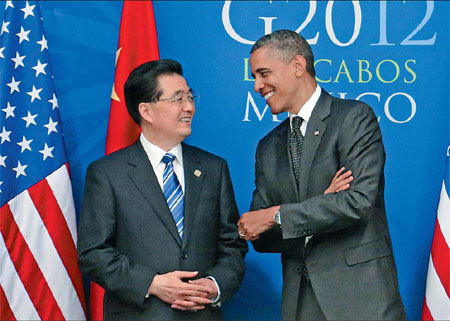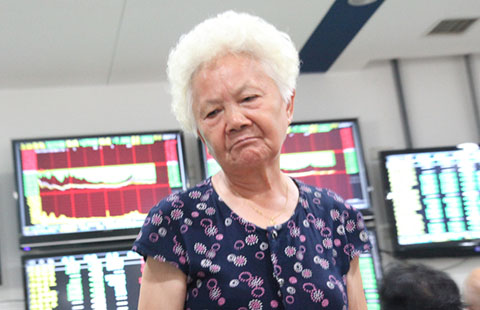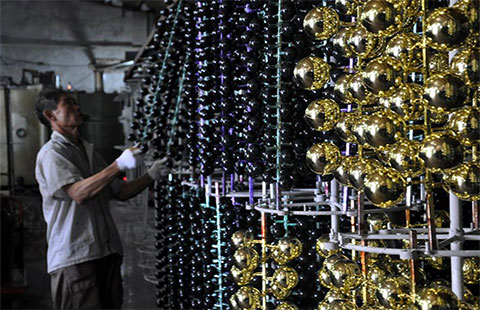Hu sets out vision for US ties
By Wu Jiao in Los Cabos, Tan Yingzi in Washington and Cheng Guangjin in Beijing (China Daily) Updated: 2012-06-21 09:24
|
 |
|
President Hu Jintao and his US counterpart Barack Obama share a light moment during the G20 Summit in Los Cabos, Mexico, on Tuesday. [Photo/Xinhua] |
President outlines model of relations between world's major powers
Differences with China must be properly handled by the United States as both countries strive to forge a new type of advantageous relationship between big powers, President Hu Jintao said on Tuesday.
Analysts said that Hu is addressing the key to a stable and beneficial relationship, especially ahead of November's US presidential election.
Hu put forward a proposal outlining a new model of great-power relations, a concept he initiated in a speech during the China-US Strategic and Economic Dialogue held in May in Beijing.
Hu said on Tuesday that both countries should maintain high-level strategic communication, manage differences and keep any potential interference at bay.
He said he hoped that the US will adopt a positive and pragmatic approach, respect China's interests and prevent domestic politics from disturbing ties.
US President Barack Obama agreed with Hu on developing the next phase of the relationship.
The US is ready to work with China to cultivate a new model of great-power relations to effectively tackle global challenges, Obama said.
A prosperous and stable China is in the interests of the US and the world, just as a prosperous and growing US benefits China and the world, he said.
The leaders met during the G20 Summit in Los Cabos, Mexico, their second meeting this year and the 12th in three years.
Both leaders commented positively on ties, analysts said, but emphasized that more needs to be done to enhance trust.
The meeting set a positive tone, Jia Xiudong, a senior researcher on international affairs at the China Institute of International Studies, said.
"The US is unwilling to see any major setback in ties ahead of the presidential election, but the possibility remains that Obama will take trade measures as he faces domestic pressure," Jia said.
The Asia-Pacific region, more than any other area, is where China and the US have the most converging interests, and "benign interaction between the countries is the key", he said.
Philip Levy, resident scholar at the American Enterprise Institute, told China Daily that the G20 provides a regular opportunity for US and Chinese leaders to work through mutual concerns.
"It does so with somewhat less pressure than a state visit and it reminds the leaders that US and Chinese actions often have repercussions for the rest of the world. Such meetings always result in claims of success, but sometimes those claims can be merited, thereby justifying the work that goes into preparing summits," Levy said.
Bilateral trade
Hu said on Tuesday that as China and the US are the world's two largest economies, maintaining robust trade relations is of great significance.
Trade between China and the US, each the second-largest trade partner of the other, reached $446.6 billion last year.
Official figures from China also show that US companies invested more than $67.6 billion in China by the end of 2011, while Chinese companies invested $6 billion in non-finance sectors in the US.
China is boosting domestic demand and has full confidence in sustaining the strong momentum of its economic growth, Hu said.
Both countries should boost economic cooperation and increase trade, Hu said.
Contact the writer at wujiao@chinadaily.com.cn
Xinhua contributed to this story.
- Green finance booming among Chinese banks
- Chinese vice premier stresses consultative service for manufacturing
- Xi stresses unity for Tibet, vows fight against separatism
- PBOC researcher blames Fed for stocks rout
- Boeing projects 6,330 airplanes for China over next 20 years
- Investors should forgo anxiety over China despite stock fluctuation
- Securities regulator staff, journalist asked to assist investigation in trading violation
- Mainland, Taiwan sign agreements on flight safety, taxation

















